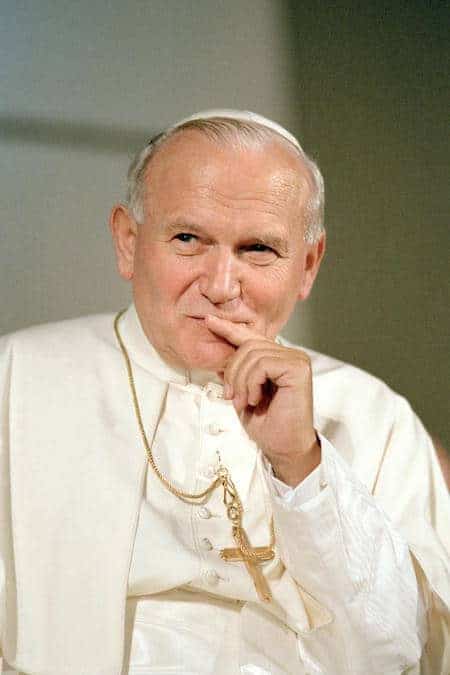Top 10 St. John Paul II Quotes on Politics and Government
by CAPP-USA

Top 10 St. John Paul II Quotes
St. John Paul II Quotes on Politics
With so many to choose from, here are our top 10 St. John Paul II quotes on the role of government.
- Referring to governments made up of three branches (legislative, executive, and judicial) Pope St. John Paul II said: “[I]t is preferable that each power be balanced by other powers and by other spheres of responsibility which keep it within proper bounds. This is the principle of the ‘rule of law’, in which the law is sovereign, and not the arbitrary will of individuals.” (Centesimus Annus, 44)
- Pope St. John Paul II pointed out that the key CST principle of Subsidiarity: “insists on necessary limits to the State’s intervention…inasmuch as the individual, the family and society are prior to the state and inasmuch as the State exists in order to protect their rights and not stifle them”. (Centesimus Annus, 11)
- “By intervening directly and depriving society of its responsibility, the Social Assistance State leads to a loss of human energies and an inordinate increase in public agencies which are dominated more by bureaucratic ways of thinking than by concern for serving their clients, and which are accompanied by an enormous increase in spending. In fact, it would appear that needs are best understood and satisfied by people who are closest to them and who act as neighbors to those in need”. (Centesimus Annus, 48)
- Under socialism, freedom “is replaced by a burdensome system of bureaucratic control which dries up the wellsprings of initiative and creativity”. (Centesimus Annus, 25)
- St. John Paul II firmly emphasized the family, saying the State “should never fail in its fundamental task of respecting and fostering the family“. (Familiaris Consortio, 45)
- “[T]he Church openly and strongly defends the rights of the family against the intolerable usurpations of society and the State”. (Familiaris Consortio, 46)
- There are “necessary limits to the State’s intervention…inasmuch as the State exists in order to protect their rights and not stifle them.” (Centesimus Annus, 11)
- “The apex of development is the exercise of the right and duty to seek God, to know him and to live in accordance with that knowledge.” (Centesimus Annus, 29)
- “One must be guided by a comprehensive picture of man which respects all the dimensions of his being”. (Address to the 24th Plenary Session of the Pontifical Council for the Laity)
- “Authentic democracy is possible only in a state ruled by law on the basis of a correct view of the human person…Nowadays there is a tendency to claim that agnosticism and skeptical relativism are the philosophy and the basic attitude which correspond to democratic forms of political life. Those who are convinced that they know the truth and firmly adhere to it are considered unreliable from a democratic point of view, since they do not accept that truth is determined by the majority or that it is subject to variation according to different political trends. It must be observed in this regard that if there is no ultimate truth to guide and direct political activity, then ideas and convictions can easily be manipulated for reasons of power. As history demonstrates a democracy without values easily turns into open or thinly disguised totalitarianism.” (Centesimus Annus, 46)





